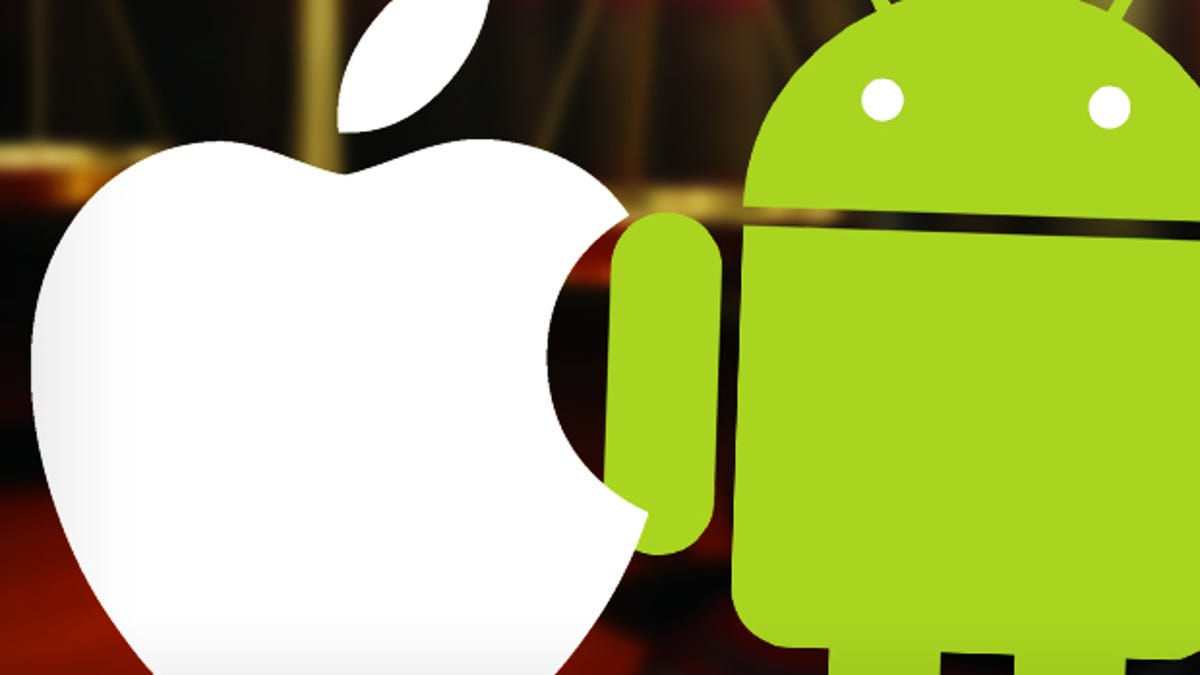Why Apple doesn't just sue Google and get it over with
In the complicated world of patent litigation, it's actually easier for Apple to go after Samsung and other handset manufacturers than to take on Google directly.

Apple's war against Android and Google has been less "thermonuclear" and more precision sniping against key partners, with the two technology giants so far unwilling to directly go head to head.
The kerfuffle between Apple and Samsung Electronics (read CNET's full coverage here) has breathed new life into the lingering question: why doesn't Apple just sue Google? Google, after all, is the architect of the Android operating system, which is the common thread tying together all of Apple's legal targets. And after the late Steve Jobs vowed to wage a "thermonuclear war" to destroy Android, Google presumably would be the most logical target.
Yet Apple has gone out of its way to avoid attacking Google head on, instead firing off lawsuit after lawsuit against partners such as Samsung and HTC. That's because it's easier to pin blame on the handset makers, who actually generate revenue and profit off of those Android phones, than Google, which gives the operating system away for free and only indirectly generates revenue through mobile advertising. It's also easier to stack up an iPhone next to a Galaxy S and point to the similarities.
"I don't know what products Google has with its name on it," said Mark Kesslen, a patent litigation lawyer for Lowenstein Sandler PC. "Samsung seems a heck of a lot easier."
The lawsuits are part of a broader effort by Apple to halt the momentum of Android, which has long surpassed iOS as the dominant mobile operating system. Apple isn't just looking for damages; it wants the phones barred from sale.
But Google's legal know-how and patent portfolio, which it recently bulked up via the acquisition of Motorola Mobility, make it a tougher legal opponent than the likes of HTC. Legal experts say Apple could deal more damage and potentially reap a higher reward going after multiple handset manufacturers than by just striking at Google.
The arms-length attitude of both companies may all change with Google taking an active role because of Motorola, which is embroiled in its own legal entanglements with Apple. Google itself has been reluctant to publicly step into the fray, although CNET learned that the company has been quietly lending support to its partners.
Apple didn't respond to multiple attempts for comment. We'll update the story when the company gets back to us.
Google declined to comment to CNET.
A more sympathetic case
When it comes to complicated patent trials, getting a simple story across to the jury greatly improves the odds of winning.
That's why Apple is going after the handset manufacturers instead. With the likes of HTC and Samsung, Apple can simply throw up several phones and point to the revenue generated from the devices. By making the case more about design and feel and less about the intricacies of patents, the company has a case that jurors can understand. It doesn't hurt that, after Apple itself, Samsung is the second-most profitable smartphone player in the world.
"As a plaintiff, you have an easier row to hoe if you can show the defendant makes lots of money," said Pierre Yanney, a patent lawyer who works for Stroock & Stroock & Lavan.
If a company generates revenue with an offending product, it's easier for a jury to justify awarding heavier damages, he added.
Apple could have extended the net to cover Google, legal experts say, but that would have been a harder case to argue given Google's lack of direct revenue from Android. Still, Apple could have technically argued that the use of infringing patents by Google hurt its business, and forced monetary damages, even if the revenue is indirectly gained.
Casting such a wide net would make for a more complicated case, legal experts say, and recent legal rulings may have complicated such arguments.
More vulnerable targets
The handset manufacturers, meanwhile, are also seen as weaker targets than Google. Samsung is no slouch when it comes to patents related to wireless technology, but lawyers say it lacks the legal prowess shown by Google.
Google, for instance, recently won another high-profile patent trial in which the company successfully defended itself against Oracle's claims that Android was based on its Java patents. As CNET has reported, Samsung has opted to use Quinn Emanuel, the law firm of choice for Google.
Google, meanwhile, has been stockpiling patents from Motorola and a few other companies such as IBM, and likely has a number of more relevant patents than Samsung, Yanney said.
"Even if 99 percent of Google's patents are irrelevant and worthless, that's still a few hundred potentially good patents," he said.
Meanwhile, Apple would likely prefer going after multiple vendors, since the company would stand to get a bigger payout with damages coming from multiple companies, as opposed to just Google.
More important than monetary rewards, Apple is looking to intimidate the Android community and potentially to halt the sale of Android mobile devices. Taking on one handset vendor after another is a good way to intimidate the entire field and cause some heartburn among the Android ranks.
Going after Google, by contrast, wouldn't yield injunctions on specific products, since Google doesn't actually make any of them. Conversely, it's been relatively easy for Apple to get bans -- even if only temporary ones -- on devices such as the
"Ultimately, Apple wants the injunctions," Kesslen said. "It's not about the damages. They want to go for the kill and force redesign."

